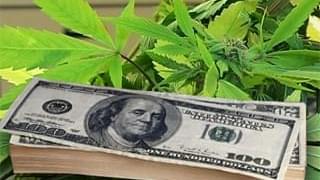
Marijuana: America's Biggest Cash Crop
Published on 2/2/12
Last year, the cannabis plant brought in as much revenue to the United States as soybean, hay, and vegables combined making it the number one cash crop in the states. Even with these numbers it is a wonder that not everyone can see the benefit of legalizing this great plant. It still remains very contriversal through all 50 states although some have started to see the light at the end of the tunnel. By legalizing marijuan the United States would benefit in many ways such as: paying off our trillions in debt and reducing the death toll south of the border. Instead we have continued to increase our spending by putting marijuana users in jail.
America's largest cash crop brings in an average revenue of $35.8 billion a year, according
to drugscience.org. This is the same as the revenue of soybeans, hay and vegetables combined. The crop is not corn, nor is it wheat or cotton, and it certainly is not fruit. America's most valuable harvest is cannabis, or as it's more commonly known, marijuana.
Marijuana legalization is an issue considered controversial by many, but if America would look at the economic facts behind the sale and production of marijuana, we would understand marijuana legalization is not an irresponsible decision, but one that possibly could save our failing economy.
Marijuana first was illegalized in the United States during 1937 under the "Marijuana Tax Act." Since prohibition, a war on drugs has been rampant throughout Mexico and the U.S. The illegal import of drugs into the country is a multi-billion dollar a year industry, with all the profit going to criminals, killers and dangerous organizations, according to legalize.org.
If marijuana were legalized and regulated, this war on drugs would come to an end, and the funding could be put to much better use, such as paying off America's $15 trillion debt. The death toll in Mexico from the effects of this war hit 50,000, according to a Jan. 11 National Post article. That's 50,000 lives that could have been spared if America simply would act sensibly.
What comes with this war is a rising rate in drug-related arrests and prisoners. The United States is one of the most "criminal" countries, with only 5 percent of the world's population, but 25 percent of its prisoners, according to a 2009 Time Magazine article. One-third of those prisoners are serving time for nonviolent drug crimes, 48 percent of which are strictly marijuana-related. If legalization passed, all this money and time spent on drug crimes could be spent focusing on gangs, violence, organized crime and the prosecution of dangerous, violent criminals.
To break it down, I'll explain the price of keeping just one man convicted of a marijuana related drug time in jail, according to drugpolicy.org. Arrest and conviction is $150,000. An additional cell unit ranges from $50,000 to $100,000. Food and housing together make up about $30,000 a year, and with the average sentence of five years for drug-related crimes, that adds up to another $150,000. The total cost to keep a five-year-sentence drug dealer in jail is $450,000. Multiply that by the Library of Congress's estimated 6,500 marijuana crime prisoners, and we've got a lot of money that could have been spent on something like funding Truman, which, after Missouri Gov. Jay Nixon's proposal of a 12.5 percent cut to higher education, most likely will face major cuts.
Now imagine a world in which marijuana was regulated in a way similar to tobacco and alcohol. Marijuana would be taxed and sold to those 18 and older. The regulation would completely eliminate its sales via the black market. The regulations virtually would end the violent crimes that come with illegal dealing. The industry would create hundreds of thousands of jobs in agriculture, packaging, marketing and advertising. Considering America's unemployment rate currently is at 8.5 percent, according to ncls.org, this industry could be extremely beneficial.
A taxation system seems to be the highest selling point for the idea.
"An examination of the external costs imposed by cannabis users on the rest of society suggests that a harmfulness tax of between $.50 and $1 per joint is appropriate. It can be estimated that excess taxes in this range would raise between $2.2 billion and $6.4 billion a year. Legalization would save the taxpayers around $8 billion to $16 billion, plus the economic benefits of hemp agriculture and other spinoff industries, according to canorml.org. Having a possible $16 billion a year spent towards getting our nation out of debt would be ideal.
This is a lot of information to take in, but the only way to get the message across is by proving the facts about legalization. The decision to legalize would end the destructive and expensive war on drugs. Hundreds of thousands of dollars from the legal system would be saved, and there would be a greater opportunity for the police to focus on more violent crimes. Finally, the sales and regulations of marijuana would end the violence that comes with black market sales, and even contribute to raising enough money for the United States to make its way out of debt.
Written By: Lauren Kellett (freshman communication major from Florissant, Mo.)
